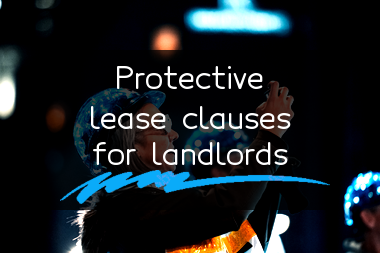- 1. Right of Entry Clause: This allows the landlord to access the rental property for specific reasons such as repairs, maintenance, and emergency situations.
- 2. Abandonment Clause: If the tenant leaves the rental property before the lease term is up, this clause allows the landlord to re-enter the property, retake possession, and re-lease it to another tenant.
- 3. Subleasing Clause: This clause states whether or not the tenant is able to sublease the rental property to another tenant.
- 4. Rent Increase Clause: This clause allows the landlord to increase the rent after a specific period of time has passed, usually at the end of the lease term.
- 5. Security Deposit Clause: This explains the amount of the security deposit that the tenant must pay before moving in, and the conditions under which the deposit may be forfeited or refunded.
- 6. Late Payment Clause: This clarifies the process for late rent payments, including fees for late payment and eviction procedures.
- 7. Renewal Clause: This outlines the terms and conditions of renewing the lease, including rent increases, extension periods, and any changes to the original lease agreement.
- 8. Destruction or Damage Clause: This outlines the responsibilities of the landlord and tenant in the event that the rental property is damaged or destroyed due to fire, natural disaster, or other unforeseeable event.
- 9. Pets Clause: This allows the tenant to keep pets on the rental property, including any restrictions or additional fees.
- 10. Tenant Responsibility Clause: This details the tenant's responsibilities regarding maintenance, repairs, cleaning, and upkeep of the rental property.
Guest Clauses
Guest clauses are provisions in a rental or lease agreement that outline the rules or limitations for guests staying overnight or visiting the rented property. These clauses may include the number of guests allowed, the amount of time they can stay, and the requirement that the tenant obtain permission from the landlord prior to having guests stay overnight.
Guest clauses are important for both landlords and tenants, as they help to ensure that the rental property is not overcrowded, that the tenant is not subleasing the property without permission, and that the landlord is notified of anyone who may be entering or staying on the premises. Violating a guest clause can result in consequences such as eviction or additional fees.
Utility Responsibility
Utility responsibility refers to the duties and obligations of utility companies to provide essential infrastructure services to the public. These services include water, electricity, gas, and telecommunications. Utility companies have the responsibility to ensure the continuous and safe supply of these essential utilities to their customers at competitive rates.
Utility companies must adhere to government regulations and standards to ensure that their equipment, processes, and products meet safety and health requirements. They must also take measures to protect the environment by using sustainable and eco-friendly processes.
Ultimately, utility responsibility is about providing a reliable, efficient, and affordable utility service to the public while prioritizing the safety and well-being of their customers, the community, and the environment.
Over-use of utilities
The overuse of utilities refers to the excessive and unnecessary use of energy, water, and other utilities in homes, businesses, and other settings. Overuse of utilities can lead to wasted resources, increased bills, and environmental damage. Common examples of overuse include leaving lights and appliances on when not in use, using excessive amounts of water for washing and cleaning, and relying on energy-intensive devices to heat or cool living spaces. This can result in increased greenhouse gas emissions, depletion of natural resources, and higher costs for individuals and communities. To reduce overuse of utilities, it is important to adopt sustainable practices such as energy-efficient appliances, water-saving devices, and conservation strategies.
Utility malfunction
A utility malfunction refers to an unexpected or non-functional operation or breakdown of equipment or infrastructure that is responsible for providing a public service, such as electricity, gas, water, or sewage. This can happen due to a variety of reasons like natural disasters, mechanical failures, human error, or technology glitches. Utility malfunction can lead to service disruptions causing inconvenience, property damage, safety hazards, or even health risks to the consumers. It is important to report any utility malfunction to the concerned authorities immediately to avoid further complications and ensure timely resolution of the issue.
Property inspections
Property inspections are an important process of evaluating the condition of a property. It is a type of inspection that thoroughly examines the structure and systems of a property primarily for safety, structural integrity or functional issues. Property inspections are most commonly conducted for residential homes or commercial properties, and are typically carried out by licensed property inspectors.
During a property inspection, the inspector will visually evaluate the property and its components. This may include the foundation, roofing, walls, floors, electrical systems, plumbing, HVAC systems, and other critical parts of the property. They will try to identify any potential defects, damages, or maintenance issues that may affect the safety, functionality, and value of the property.
After the inspection, the inspector will prepare a comprehensive report detailing their observations, any issues they found, and recommendations for repairs or maintenance that may be needed. Property inspections are essential to ensure that buyers, sellers, renters, and property owners are aware of the exact condition of a property before making any significant commitments or transactions involving the property.
Just one more thing: if you liked the article, please like us on social media and share this article with friends.



